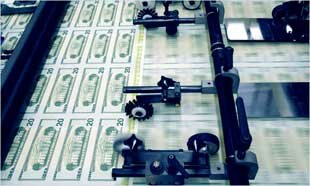Great news, America! Having just celebrated Labor Day, we can now bask in the revelation that our long economic nightmare is over. Forget recession, much less a depression, our country is poised to spring into a new era of financial prosperity!
We know that this is so because we're being told so by top economists, Wall Street bankers and others in the know. To put the icing on this happy economic cupcake, President Obama even interrupted his Martha's Vineyard vacation late last month to announce that he was reappointing Ben Bernanke to a second term as chairman of the Federal Reserve banking system.
In our country's high-flying financial circles, Ben is being hailed as "a monumental figure" for engineering the multitrillion-dollar bailout of Wall Street giants. Those giants are now claiming to be profitable again, and the Dow Jones average has begun to tick upward, so there's joy in the upper stratosphere of our economy, and those who dwell there have blessed Bernanke's ordainment as the high priest of America's monetary policy.
And why wouldn't they love him? After all, the compassionate Bernanke and other bailout officials allowed them to retain their high positions in the Wall Street hierarchy (despite their demonstrable ineptness, malfeasance and failure). So happy days are here again, and banking executives are now popping champagne corks and showering themselves with bonuses and perks - as if nothing unpleasant had happened in the past couple of years.
Goldman Sachs, JPMorgan Chase and other banking baronies have already set aside billions of dollars each to divie up at year's end - bonus booty for their self-indulgent barons.
This is irrational exuberance at work, but - hey - a big bonus is the perfect psychotic sedative, making one's irrationality seem normal.
Meanwhile, if you're among the vast majority of Americans who do not reside at the top, chances are that you don't measure economic recovery by Wall Street profitability, stock prices and executive bonanzas. A more relevant measure for you might the availability of good jobs.
If so, good luck.
Since our present economic dive began (not long after Ben took the helm at the Fed, by the way), our economy has shed almost 7 million more jobs than it created. Indeed, there are fewer jobs available today than in 2000, even though about 12 million additional workers have entered the job market since then. While bankers are hoisting self-congratulatory flutes of Dom Perignon and giddily reverting to the irrational, grab-all-you-can ethic of executive pay, our country's official jobless rate is headed beyond 10 percent.
Consequently, wages are down, household income has fallen in eight of the last 10 months and consumer spending is now nothing but wishful thinking. This is why workaday folks are less inclined than their Wall Street brothers to enshrine Bernanke's "monumental" likeness on Mount Rushmore.
Well, say most politicos and pundits, even the job situation is improving. In July, they note, the unemployment rate dropped by one-tenth of one percent. What they did not note is that this speck of "good" news was not the happy result of more people getting jobs. Rather, the blip was caused by the fact that 450,000 Americans had become so discouraged by their months of fruitlessly searching for work that they simply gave up the hunt in July.
In statistical la-la land, you see, those who aren't actively looking for jobs are not counted as unemployed.
Maybe they should take the advice recently suggested by The Onion: Get drunk. Just before Labor Day, this satirical newspaper's lead story was headlined, "Nation's Unemployment Outlook Improves Drastically After Fifth Beer." According to the Onion's parody, economists found that out-of-work people's spirits perked up somewhere between the third and fourth beer, but the fifth brewski was when things turned really rosy for them.
Behind the official stats, the real jobless numbers are sobering. When you tally up the officially unemployed with discouraged workers and the underemployment (part-time workers who want full-time jobs), 19 percent of Americans - 30 million people - can't find the work they need. This is our economy's true crisis, and there can be no happy talk until we deal with it.
Source: Jim Hightower - Creator.com
September 10, 2009
MSN - - - Wikipedia - Hamsayeh.Net



